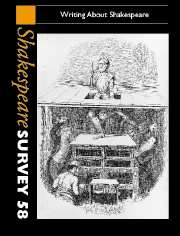Book contents
- Frontmatter
- Having Our Will: Imagination in Recent Shakespeare Biographies
- Toward a New Biography of Shakespeare
- Jonson, Shakespeare and the Exorcists
- ‘Lending soft audience to my sweet design’: Shifting Roles and Shifting Readings of Shakespeare’s ‘A Lover’s Complaint’
- ‘Armed at point exactly’: The Ghost in Hamlet
- Writing About Motive: Isabella, the Duke and Moral Authority
- Writing Performance: How to Elegize Elizabethan Actors
- Elizabeth Montagu: ‘Shakespear’s poor little Critick’?
- Rewriting Lear’s Untender Daughter: Fanny Price as a Regency Cordelia in Jane Austen’s Mansfield Park
- The Prequel as Palinode: Mary Cowden Clarke’s Girlhood of Shakespeare’s Heroines
- Shakespeare Among the Workers
- Virginia Woolf Reads Shakespeare: Or, her Silence on Master William
- Shakespeare and the Invention of the Epic Theatre: Working with Brecht
- Dramatizing the Dramatist
- Shakespeare in Drama Since 1990: Vanishing Act
- Writing about [Shakespearian] performance
- Shakespeare and the Prospect of Presentism
- Writing Shakespeare in the Global Economy
- The ‘Complexion’ of Twelfth Night
- Translation as Appropriation: Vassilis Rotas, Shakespeare and Modern Greek
- How Old Were Shakespeare’s Boy Actors?
- Mistress Tale Porter and the Triumph of Time: Slander and Old Wives’ Tales in The Winter’s Tale
- Shakespeare Performances in Ireland, 2002–2004
- Shakespeare Performances in England, 2004
- Professional Shakespeare Productions in the British Isles January–December 2003
- The Year's Contributions to Shakespearian Study 1 Critical Studies
- 2 Shakespeare in Performance
- 3 Editions and Textual Studies
- Books Received
- Index
3 - Editions and Textual Studies
Published online by Cambridge University Press: 28 March 2007
- Frontmatter
- Having Our Will: Imagination in Recent Shakespeare Biographies
- Toward a New Biography of Shakespeare
- Jonson, Shakespeare and the Exorcists
- ‘Lending soft audience to my sweet design’: Shifting Roles and Shifting Readings of Shakespeare’s ‘A Lover’s Complaint’
- ‘Armed at point exactly’: The Ghost in Hamlet
- Writing About Motive: Isabella, the Duke and Moral Authority
- Writing Performance: How to Elegize Elizabethan Actors
- Elizabeth Montagu: ‘Shakespear’s poor little Critick’?
- Rewriting Lear’s Untender Daughter: Fanny Price as a Regency Cordelia in Jane Austen’s Mansfield Park
- The Prequel as Palinode: Mary Cowden Clarke’s Girlhood of Shakespeare’s Heroines
- Shakespeare Among the Workers
- Virginia Woolf Reads Shakespeare: Or, her Silence on Master William
- Shakespeare and the Invention of the Epic Theatre: Working with Brecht
- Dramatizing the Dramatist
- Shakespeare in Drama Since 1990: Vanishing Act
- Writing about [Shakespearian] performance
- Shakespeare and the Prospect of Presentism
- Writing Shakespeare in the Global Economy
- The ‘Complexion’ of Twelfth Night
- Translation as Appropriation: Vassilis Rotas, Shakespeare and Modern Greek
- How Old Were Shakespeare’s Boy Actors?
- Mistress Tale Porter and the Triumph of Time: Slander and Old Wives’ Tales in The Winter’s Tale
- Shakespeare Performances in Ireland, 2002–2004
- Shakespeare Performances in England, 2004
- Professional Shakespeare Productions in the British Isles January–December 2003
- The Year's Contributions to Shakespearian Study 1 Critical Studies
- 2 Shakespeare in Performance
- 3 Editions and Textual Studies
- Books Received
- Index
Summary
EDITIONS
There is an uncanny connection between the Arden Shakespeare and the Oxford Shakespeare. An Arden editor and an Oxford editor can be at work on the same play for many years, have virtually no contact with one another and yet produce their separate editions nearly simultaneously. Such was the case when the Arden2 Troilus and the Oxford Troilus both appeared in 1982, and again when the Arden3 Henry VI Part Three appeared within weeks of the Oxford edition in 2001. Since it seems implausible that the two publishers would conspire to flood the market with new editions of relatively unpopular plays, I take it that these are coincidences rather than instances of collusion. This year has brought one more: the appearance of the Arden3 Pericles, edited by Suzanne Gossett, and of the Oxford Pericles, edited by Roger Warren.
Comparison of such twins is inevitable, and seems particularly called for here. Gossett presents her edition, in part, as a response to the ‘conjectural reconstruction’ of the play in the Oxford Complete Works, which she views as an ‘extreme’ example of rewriting that often ‘cannot be justified’. Adopting what she describes as ‘a moderate approach, neither reconstructing nor refusing to emend’, Gossett seeks ‘to create a credible, bibliographically defensible, reading and performance script’. Warren, in marked contrast, offers ‘a conjectural reconstruction of the play that lies behind the corrupt text of the Quarto’, basing his text on the previous Oxford reconstruction. Whereas the Arden3 title-page advertises a single-handed encounter between the editor and her text – ‘pericles, Edited by Suzanne Gossett’ – the Oxford title-page is awash in authorial and editorial agents: ‘A reconstructed text of Pericles, Prince of Tyre, by William Shakespeare and George Wilkins, edited by Roger Warren on the basis of a text prepared by Gary Taylor and MacD. P. Jackson’.
- Type
- Chapter
- Information
- Shakespeare Survey , pp. 343 - 357Publisher: Cambridge University PressPrint publication year: 2005

